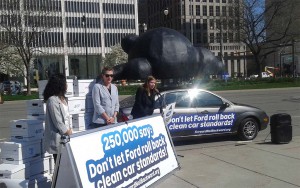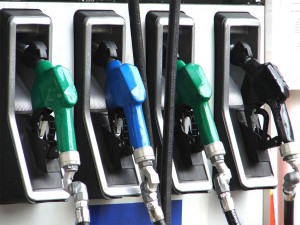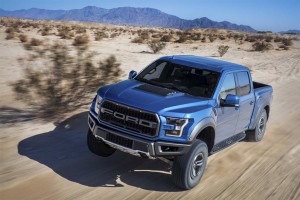
Automakers are caught in the middle over the CAFE debate and could face even more challenges if the proposed Trump rollback drags on in court.
Despite, or perhaps because of, the Trump Administration’s plan to roll back the Corporate Average Fuel Economy, automakers are finding themselves in what one long-time industry analyst calls “limbo,” and it could be a year or more before they’ll actually be able to incorporate the CAFE update into their plans due to anticipated legal challenges.
As a result, it could be well into the upcoming decade before the White House revisions actually have any significant impact, according to numerous industry executives who spoke to TheDetroitBureau.com, if any changes ever actually occur.
There is the very real possibility that the courts could rule against the proposed changes or that the legal battle drags on long enough for a new administration to come into office and revert back to the guidelines established under the Obama White House. As a result, automakers and suppliers face a major conundrum when it comes to planning for products set to come out through the middle of the coming decade.
“I can’t see anyone backing off” until all the court challenges are completed, said one industry executive with a multinational automaker. “We can only work on what is already law,” added an official with one of the Detroit-based companies.
(For the complete story on what the CAFE changes include, Click Here.)

The White House estimates the revised CAFE standard will require an extra 500,000 barrels of oil a day.
For the record, industry officials who spoke with TheDetroitBureau referred to a statement by two industry trade groups, the Auto Alliance, and Global Automakers, which said that member companies “support continued improvements in fuel economy,” while also seeking “flexibilities that incentivize advanced technologies while balancing priorities like affordability, safety, jobs, and the environment.”
The debate over CAFE has been ongoing since it was first enacted more than four decades ago. A rare détente was achieved when, in 2012, automakers, environmentalists and state and federal regulators crafted a compromise setting a phased-in target of 54.5 mpg to be reached by 2025. Due to credits and adjustments, the real-world figure was to be in the low to mid-40 mpg range.
The revised mileage standard announced on Thursday would freeze CAFE at the level the industry was expected to reach in 2020, about 37 mpg in real-world numbers. It would be the “sweet spot,” according the EPA Deputy Administrator Bill Wehrum, balancing factors such as fuel prices, emissions, safety, consumer demand and the potential impact on highway safety.
If the freeze itself didn’t send off flares for state regulators, as well as consumer and environmental groups, what really got them up in arm was the plan to strip California of its authority to set tougher CO2 mandates – which, effectively, allows the state to set fuel economy targets since carbon dioxide levels are directly tied to fuel consumption. What has particularly concerned the auto industry is California’s use of that Clean Air Act waiver to set minimum sales targets for zero-emissions vehicles.
“We are ready to do what is necessary to hold this Administration accountable,” said California Attorney-General Xavier Becerra, the state planning to join 18 others, along with Washington, D.C., in filing a lawsuit to block the CAFE revisions.
(For more on that lawsuit, Click Here.)
The joint proposal by the EPA and the National Highway Traffic Safety Administration will take months to put on the rulebook, and the legal challenges could stretch things well into 2019, perhaps beyond, according to experts.
And that’s where the rub begins for the auto industry. “We can only work on what’s required. You don’t change things according to what isn’t law,” the official with the Detroit-based carmaker cautioned.
The problem is that with the auto industry’s long lead times, manufacturers have already locked in place most of the planning and development for their 2020 and even 2021 models and even if they had a free hand to act now, they’d have to stretch to address much more than model-mix plans pushing into 2022.
Were a final court sign-off on the EPA/NHTSA plan not come before the end of 2019, it would be difficult to make significant changes to products coming before 2023.
“Nobody, including Toyota, can turn on a dime,” said Scott Vazin, the U.S. head of public relations for Toyota, one of the few industry insiders willing to talk on the record about the CAFE revisions.
So, for now, automakers will have to proceed pretty much as if nothing will change, said David Andrea, a long-time auto industry analyst and consultant. That means moving forward with billions of dollars in R&D on more advanced fuel efficiency technology. “It’s always more expensive to catch up” if you delay those decisions to wait for a final decision on CAFE, explained Andrea.
The conundrum is even more severe for industry suppliers, he said, They have to move forward to develop the technologies automakers might need while knowing that, if the CAFE revisions survive the court battle, demand for those features could vanish overnight.
(Click Here to see why auto suppliers are growing pessimistic about near-term prospects.)
There is always the possibility that a compromise could emerge. EPA’s Wehrum and his NHTSA counterpart Heidi King said, during a Thursday morning media conference call that they were open to negotiate with the State of California. They also stressed that the 2020 mileage freeze is just the “preferred” option among several the White House will discuss during upcoming public hearings.
Among the numerous industry insiders and observers TheDetroitBureau.com spoke to, “flexibility” appears to be the single most important change they could hope for when it comes to the Obama-era mileage rules. “We and the government guessed wrong about a lot of things,” one executive said, pointing to the slower-than-expected sales of electric vehicles, and the boom in SUV and pickup demand. What’s needed, echoed analyst Andrea, are rules that reflect “consumer pull,” rather than “industry push.”
What will ultimately emerge from the CAFE “mid-term review” is far from certain and, for now and perhaps well into next year, that will leave automakers and suppliers “in limbo.”
(Toyota delivers record profit but could see future earnings collapse if Trump tariffs go into effect. Click Here for more.)


